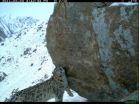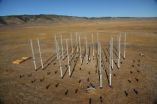(Press-News.org) Two Baylor University professors use a bottle of Coca-Cola to teach basic business principles to minimally educated entrepreneurs in developing countries.
"Sold in more than 200 countries and territories, it is a readily available resource for teaching business lessons in developing countries," said Blaine McCormick, Ph.D., professor of management at Baylor University's Hankamer School of Business. "Our goal is to teach small business owners how to increase demand for what they sell and the many ways that Coke does that."
Writing in a recent issue of the Journal of Management Education, the article "Message in a Bottle: Basic Business Lessons for Entrepreneurs Using Only a Soft Drink" includes 12 lessons that were developed after a trip to Honduras, one of the poorest countries in the Western Hemisphere. The paper is available at http://jme.sagepub.com/content/35/2/282.abstract . The topics include listening to the consumer, product placement and promotion, marketing, inventory, finance and sustainability.
In 2009, while McCormick was in Honduras, he was asked to teach some basic business practices to a fish farmer, taxi driver and grocery store owner. He put together notes, bought lunch and a bottle of Coke. When marketing came up McCormick pulled out his bottle of Coke. They then discussed all the ways in which Coke promotes and places its product in Honduras and why and possibly how Coke came to be sold in this remote village.
"Its availability is simply staggering. We experienced no difficulty whatsoever purchasing a bottle of ice cold Coke for every participant, and we were in some very remote locations accessible only by foot, horse or four-wheel drive vehicle," said Van Gray, Ph.D., professor of management and entrepreneurship at Baylor.
McCormick quickly tailored his teaching around Coke and concluded that, with additional study and preparation, a wide variety of fundamental business lessons could be taught using only a Coke bottle.
"We are involved in business education, serving people who do not have an opportunity to attend business school in their country. The Coke bottle is astoundingly effective at bringing us together with some common ground. It continues to amaze me," he said.
After returning to Baylor, McCormick and Gray developed their series of lessons. In 2010, they returned to Honduras to teach the lessons and gather data. While in Kenya and Rwanda in June 2011, they used the lessons to teach small business owners, students at a school for beauticians and hairdressers and young men at a home for street children.
"Business is a learnable skill. An instructor should be able to buy a bottle of Coke within a reasonable distance of just about any village or household in the world—an astonishing feat for The Coca-Cola Company—and have the audience fully recognize the teaching prop. Furthermore, the lessons might be recalled and reinforced with participants each time they see a Coca-Cola advertisement, drink a Coke, or share a Coke with someone else," Gray said.
McCormick and Gray said one of the risks of using a bottle of Coke as a teaching aid is that many people they taught assumed they worked for the company.
Despite some of these suspicions, the key insight about the utility of a bottle of Coke as a teaching tool continues to exceed expectations, they said. Participants proved to have surprisingly deep pools of knowledge about Coke and its associated products. They heard rich and memorable responses when querying participants about their "Coke moments," uses for an empty Coke bottle, or the varieties of coke. A second benefit of Coke is its ability to attract an audience. Whatever concerns they might have about the product, participants gladly received a complimentary bottle of Coke, the authors said.
McCormick and Gray have received some positive follow-up from one of the Honduran entrepreneurs.
"He clearly implemented two of the Coke lessons. He started basic customer research to discover new products that fellow villagers might want to purchase in his grocery store, such as hot dogs," said McCormick. "He also changed his pricing structure and now prices some high volume items lower and some lower volume specialty items higher. If it is any sign of his business success, his modest home now boasts an indoor bathroom—rare for his village."
INFORMATION:
The authors declared no potential conflicts of interests with respect to the authorship and/or publication of this article and received no financial support for it.
About Baylor University
Baylor University is a private Christian university and a nationally ranked research institution, classified as such with "high research activity" by the Carnegie Foundation for the Advancement of Teaching. The university provides a vibrant campus community for approximately 15,000 students by blending interdisciplinary research with an international reputation for educational excellence and a faculty commitment to teaching and scholarship. Chartered in 1845 by the Republic of Texas through the efforts of Baptist pioneers, Baylor is the oldest, continually operating university in Texas. Located in Waco, Baylor welcomes students from all 50 states and more than 80 countries to study a broad range of degrees among its 11 nationally recognized academic divisions.
About the Hankamer School of Business
Baylor University's Hankamer School of Business provides a rigorous academic experience, consisting of classroom and hands-on learning, guided by Christian commitment and a global perspective. Recognized nationally for several programs, including Entrepreneurship and Accounting, the school offers 24 undergraduate and 13 graduate areas of study. Visit www.baylor.edu/business and follow on Twitter at twitter.com/Baylor_Business.
END
Tel Aviv — Stem cells from early embryos can be coaxed into becoming a diverse array of specialized cells to revive and repair different areas of the body. Therapies based on these stem cells have long been contemplated for the treatment of diabetes, but have been held back by medical and ethical drawbacks.
Now researchers at Tel Aviv University are capitalizing on the "memories" of stem cells generated from adult cells to bring new hope to sufferers of juvenile or type 1 diabetes, which affects three million people in the United States.
Prof. Shimon Efrat of TAU's ...
This time of year is Festival time. Whether it is Glastonbury or Bestival, thousands leave their homes and offices and trek out to the countryside where they can enjoy the music, the outdoors and nature. Posh Bingo is commemorating the festivals with a number of bingo promotions.
There is Fest-Essentials. Here players who bingo the most on the digital camera pattern will win. Then there is the Hot Tune where the player who bingos the most on the candlestick pattern and the player who bingos the most on the letter C pattern, will each win GBP15 bingo funds. Finally there ...
A breakthrough in sensing at Rice University could make finding signs of Alzheimer's disease nearly as simple as switching on a light.
The technique reported in the Journal of the American Chemical Society should help researchers design better medications to treat the devastating disease.
The lab of Rice bioengineer Angel Martí is testing metallic molecules that naturally attach themselves to a collection of beta amyloid proteins called fibrils, which form plaques in the brains of Alzheimer's sufferers. When the molecules, complexes of dipyridophenazine ruthenium, ...
NEW YORK (July 13, 2011) – The Wildlife Conservation Society has discovered a surprisingly healthy population of rare snow leopards living in the mountainous reaches of northeastern Afghanistan's Wakhan Corridor, according to a new study.
The discovery gives hope to the world's most elusive big cat, which calls home to some of the world's tallest mountains. Between 4,500 and 7,500 snow leopards remain in the wild scattered across a dozen countries in Central Asia.
The study, which appears in the June 29th issue of the Journal of Environmental Studies, ...
CAMBRIDGE, Mass. — Several types of cancer, including stomach, liver and colon, are far more common in men than in women. Some scientists have theorized that differences in lifestyle, such as diet and smoking, may account for the discrepancy, but growing evidence suggests that the differences are rooted in basic biological differences between men and women.
Adding to that evidence, a new study from MIT shows that treating male mice with estrogen dramatically lowers their rates of stomach cancer — specifically, cancers caused by chronic infection by the bacterium Helicobacter ...
College Park, Md. (July 13, 2011) -- Conventional wisdom suggests that because we're approaching the theoretical limit on individual wind turbine efficiency, wind energy is now a mature technology. But California Institute of Technology researchers revisited some of the fundamental assumptions that guided the wind industry for the past 30 years, and now believe that a new approach to wind farm design—one that places wind turbines close together instead of far apart—may provide significant efficiency gains.
This challenges the school of thought that the only remaining ...
A custom-built, $2.5 million "split magnet" system with the potential to revolutionize scientific research in a variety of fields has made its debut at the National High Magnetic Field Laboratory at Florida State University.
The world-record magnet is operating at 25 tesla, easily besting the 17.5 tesla French record set in 1991 for this type of magnet. ("Tesla," named for early 20th-century inventor and engineer Nikola Tesla, is a measurement of the strength of a magnetic field.) In addition to being 43 percent more powerful than the previous world best, the new magnet ...
Researchers from the University of California, Irvine, with assistance from the San Diego Supercomputer Center at UC San Diego, have found a new approach to the creation of customized therapies for virulent flu strains that resist current antiviral drugs.
The findings, published online this week in Nature Communications, could aid development of new drugs that exploit so-called flu protein 'pockets.'
Using powerful computer simulations on SDSC's new Trestles system, launched earlier this year under a $2.8 million National Science Foundation (NSF) award, UCI's Rommie ...
To arrange for an interview with a researcher, please contact the Communications and External Relations staff member identified at the end of each tip. For more information on ORNL and its research and development activities, please refer to one of our Media Contacts. If you have a general media-related question or comment, you can send it to news@ornl.gov.
MATERIALS – Moving toward nanorobots . . .
Nanoscale robots that can flow through blood or repair complex electronics may yet be a possibility with the help of a new strategy developed at Oak Ridge National Laboratory. ...
COLLEGE PARK, Md. -- A new University of Maryland-led study finds that 'sex' between the virus responsible for the 2009 flu pandemic (H1N1) and a common type of avian flu virus (H9N2) can produce offspring -- new combined flu viruses -- with the potential for creating a new influenza pandemic.
Of course, viruses don't actually have sex, but University of Maryland virologist Daniel Perez, who directed the new study, says new pandemic viruses are formed mainly through a process called reassortment, which can best be described as viral sexual reproduction. "In reassortment, ...



